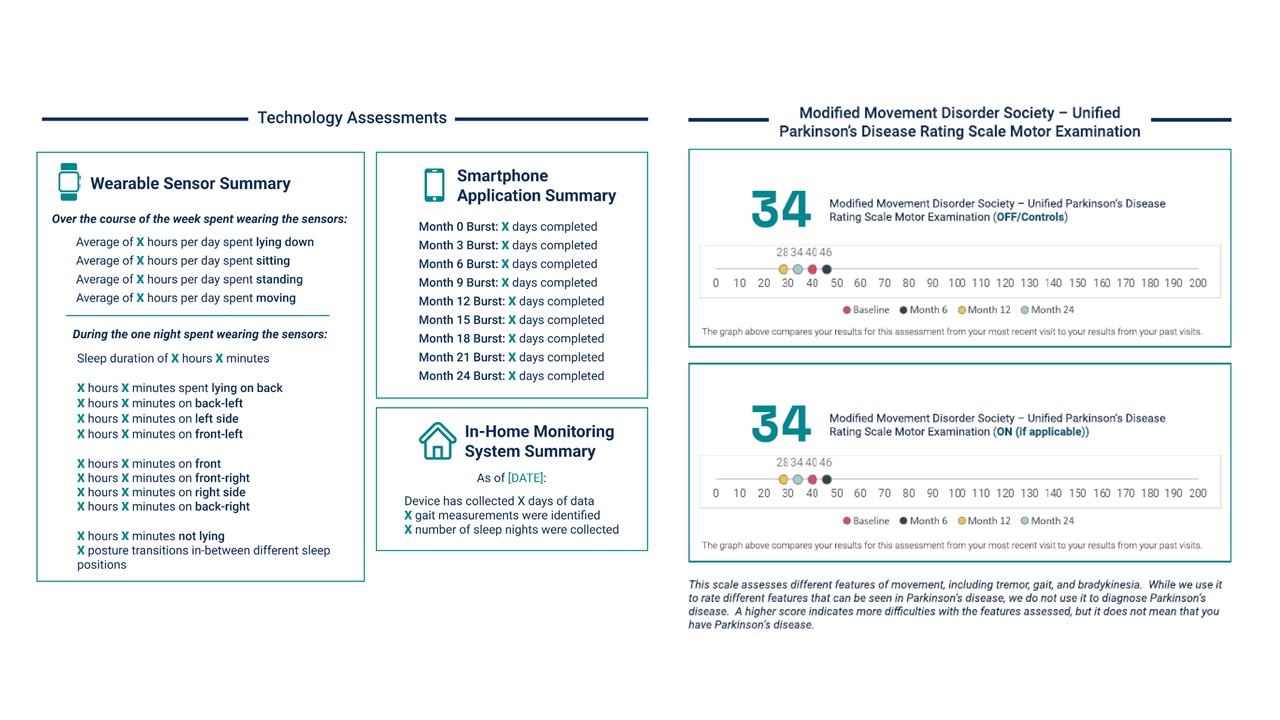Category: Parkinsonism, Others
Objective: To compare participant feedback regarding clinical assessments, patient-reported outcomes (PROs), and digital technologies provided in individual research reports in an observational study of Parkinson’s disease (PD).
Background: Most participants are not given their research results, and guidance for providing this information is minimal. Digital technology measures are becoming more commonplace in research studies, but information on best practices for communicating this data to participants is lacking.
Method: Consent from individuals with and without PD enrolled in a multimodal digital technology study was obtained to distribute individual research reports following their research visits. The report includes results from clinical assessments (MDS-UPDRS modified for remote administration as needed, Montreal Cognitive Assessment (MoCA)), PROs (sleep, anxiety, depression), and three optional digital technologies (wearable sensors, smartphone application, in-home passive monitor). After completing their study visit, participants are sent their report and invited to provide discrete and open-ended feedback on the usefulness of the report and its components. [figure1]
Results: 50 participants have received a report and have provided feedback. The information provided on clinical assessments (MDS-UPDRS: 64% found result useful, n=50; MoCA: 66%, n=50), patient-reported outcomes (64%, n=50), and wearable sensors (daily activity: 65%, n=26; sleep: 64%, n=25) were more positively rated than that of the smartphone (51%, n=37) and in-home monitoring (38%, n=26) technologies. 23 participants provided suggestions for improvement, with nearly half requesting more details regarding motor activity (e.g., tremor and balance data, step count and gait cadence) and the context or significance of their results rather than data on their compliance using the technologies.
Conclusion: Participants appreciated the detail of the feedback on clinical assessments, PROs and wearable sensors. Future iterations of the individual research report should seek to provide more meaningful data captured from the technologies and additional context on these objective measures to better align with participant preferences.
To cite this abstract in AMA style:
S. Lettenberger, S. Jensen-Roberts, E. Wagner, M. Pawlik, J. Soto, E. Hartman, P. Yang, E. Nnadika, C. Tarolli, R. Schneider, J. Adams, E. Dorsey, T. Myers. What research participants want to know: Feedback from participants in an observational study of Parkinson’s disease [abstract]. Mov Disord. 2022; 37 (suppl 2). https://www.mdsabstracts.org/abstract/what-research-participants-want-to-know-feedback-from-participants-in-an-observational-study-of-parkinsons-disease/. Accessed April 29, 2025.« Back to 2022 International Congress
MDS Abstracts - https://www.mdsabstracts.org/abstract/what-research-participants-want-to-know-feedback-from-participants-in-an-observational-study-of-parkinsons-disease/

